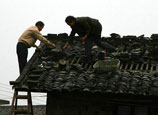
Sun Hongrong knew little about farming before he was 35, even though his dad worked on the land.
He followed his father's advice and went to college in the city, where he eventually found a job, cutting all connection with the cultivation of produce and raising of livestock.
But now, at the age of 39, he is a professional farmer and also the youngest owner of a family farm in Tongjian village, in Shanghai's suburban Songjiang district.
By planting rice and raising chickens and ducks on his nine hectare farm he earned about 300,000 yuan ($48,387) in 2012, a sum several times higher than the salary of his former job.
"No one supported me when I decided to quit as sales manager at a feed company four years ago but I have now convinced almost every one that I made the right decision," Sun said.
The term "family farm" sounds novel to most people in China. It reminds them of the vast, beautiful farmland in the United States as witnessed in movies. Conversely, in China, traditional farming is linked with hard, dirty, demanding manual labor.
However, change is afoot, just as it was almost 30 years ago when China introduced the household contract responsibility system to the vast countryside.
Then it enabled farmers to use land through long-term contracts and keep their produce after paying taxes.
In the 1980s and 1990s, before land transfers received the official nod, farmers were confined to a small patch of land. The fragmentation of farmland made the use of large machinery problematic.
However, in recent years, as more and more farmers moved to cities to seek better-paying jobs amid China's fast urbanization, lots of land was deserted and left to fall fallow.
 |
















 Now you can use mobile phone to 'call' the dead
Now you can use mobile phone to 'call' the dead


![]()
